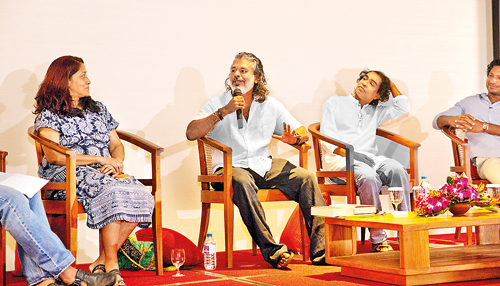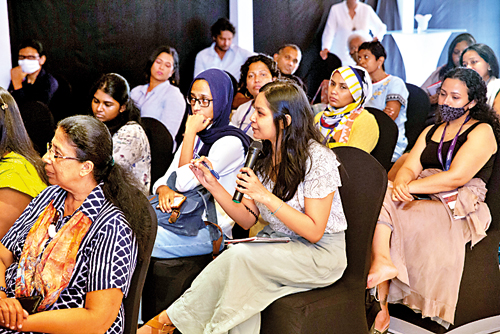A local seaside setting resounds with ‘being Sri Lankan’

A question of identity: (L-r) Vivimarie VanderPoorten, Shehan Karunathilaka, Lal Medawattegedara and Kumar Sangakkara
The Bentota Beach Hotel’s Literary Weekend promised a dive into the legacy of the Gratiaen Prize, the country’s premier English literary award being celebrated against our best known seaside resort with its own elegant identity created by Geoffrey Bawa.
Aptly, the weekend began at Lunuganga, Bawa’s garden estate, with an ‘aperitif’- a poetry reading where they celebrated four local poets associated with the Gratiaen: former winners Jean and Thiagarajah Arasanayagam, Vihanga Perera and Vivimarie VanderPoorten.
But probably the most dynamic event of the weekend, though held at the Bentota Beach’s ballroom was also connected with Lunuganga.
The intriguing panel discussion there revolved around that elusive thing- our identity as Sri Lankans.
If that identity was to be objectified, what other metaphor than Lunuganga, of which Barbara Sansoni tellingly said that only a Sri Lankan probably could fully appreciate its meaning?
Moderated by Gratiaen trustee, academic Harshana Rambukwella, the discussion featured writers and former Gratiaen winners Shehan Karunathilaka, Vivimarie VanderPoorten, Lal Medawattegedara, this year’s winner Andrew Fidel Fernando and Kumar Sangakkara.
The evening began with Kumar who, in his epic Colin Cowdrey oration, famously concluded he was “proud to be Sri Lankan.”
“But since then, I am not sure exactly if I can pinpoint what a Sri Lankan identity is,” he mused.
Today, everywhere, the lines between national identities are blurring and ironically the more this happens “the more we struggle to hold on to those divisions.”
Kumar opined that such identities tend to have to do with ‘exclusion rather than inclusion’. Which is sad because “you really cannot be an island, you cannot live on your own and you really have to live life as part of each other.”
“Experiences differ from person to person and so do the notions on culture, tradition, caste, creed, religion. But each has a relevance and importance and a certain lesson from which we can learn and grow.”
Shehan Karunathilaka, author of the award-winning Chinaman, quipped that he has his ‘author’s answer’ to nationalism and a civilian, ‘non-writer’s answer’.
As a writer of Sri Lankan literary fiction, he admits with a shrug, he gets to be on the same shelf as South Asian authors like Salman Rushdie, Arundati Roy and Michael Ondaatje catering to a sizable, hungry diaspora of South Asians “who are asking ‘who am I? I live in Kansas City, Missouri but my name is Wanniarachchi- what does that mean?’ ”
Also as a Sri Lankan he cannot, ‘despite having lived in other countries’, really bring himself to write on “say- Singapore or Hong Kong”. They are not his stories, and besides Sri Lanka has enough tales for him to mine.
But on the other hand, Shehan makes no bones about his ‘civilian’s response’ to nationalism.
“I thought that argument about Nationalism vs. Globalism was well and truly done. I thought the 20th century taught us that nationalism is a disrupted force and that therefore there’s this internet thing that was going to connect us all and we are going to hold hands like ‘we are the world’ (I am an 80s kid so I believe in all that)…
“We thought that argument is buried but sadly, in 2020, it is still well and truly alive…”
As Chinaman, Shehan’s 2010 debut, was a celebration of Sri Lankan resilience, Harshana asked, if a tumultuous decade later, the author’s faith in the islanders’ ability to bump back to shape is still on.
Vivimarie VanderPoorten talked about the predicament of being ‘the other’ both at home and abroad. While when at school her Eurasian identity marginalized her with the epithet ‘para lansiya’, only abroad would she feel Sri Lankan.
 Vivimarie owns that she has retained a very ‘dated’ idea of being Sri Lankan. To her it means being Sinhala Buddhist.
Vivimarie owns that she has retained a very ‘dated’ idea of being Sri Lankan. To her it means being Sinhala Buddhist.
She homed in on two poems dealing with the unsettling experience of not belonging anywhere. One, where in a London park a man uses such sexist and racial slurs as ‘chicken tandoori’ against her, illustrates the confusion she could be thrown into, compounded by the alleged Indian identity by the British man.
Though a Dutch Burgher Vivimarie was warned by her ‘very Sinhala Buddhist grandmother’ that she should not fall into the degenerate ways of ‘typical Burgher girls’!
Being a woman adds to being a hybrid.
“I grew up hyper aware of what I was not, what I was trying to be, and I am not sure that I have fully resolved (the problem of identity) even now.”
Andrew Fidel Fernando, whose travelogue Upon a Sleepless Isle won the Gratiaen this year, spoke about identity as a journey.
Our island tapestry was woven through journeys, he said, the Sinhalese, the Tamils, the Moors and the Malays arriving on their own itineraries.
While he is not sure about a cohesive Sri Lankan identity, throughout his wanderings he would remark certain things the islanders all shared especially ‘the pitch black sense of humour about our situation’ which he says is the reason for our resilience as a nation “because once you make a joke about something, you see it as something surmountable.”
The last word (and laugh) was reserved for Lal Medawattegedara, who denounced all claims to be “an ethnographer, historian, or a commentator for all Sri Lankans.”
As “a fiction writer who listens only to the voices in his head”, he brought in the protagonist of his novel Playing Pillow Politics at MGK, the 2012 Gratiaen prize winner, “a ‘vegetable’ with no gender, immobile, cannot hear- with only the ability to think. He watches how other people try to create identities and make fools of themselves.”
“That is the Sri Lankan identity- a vegetable. I think this identity creation is a terrible business and it’s good people do it only because people at MGK can laugh at you.”


